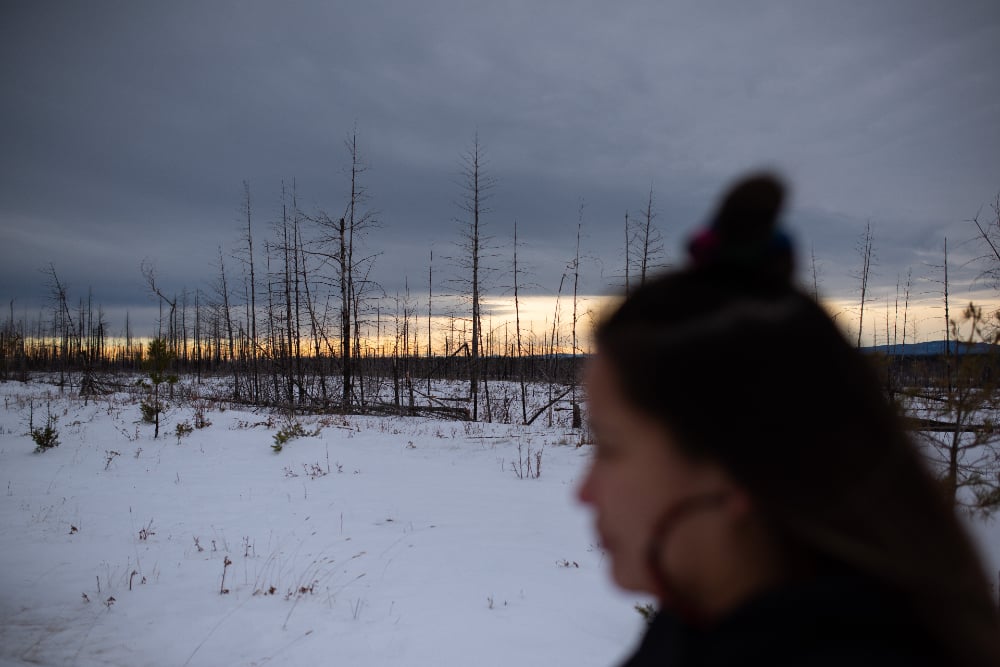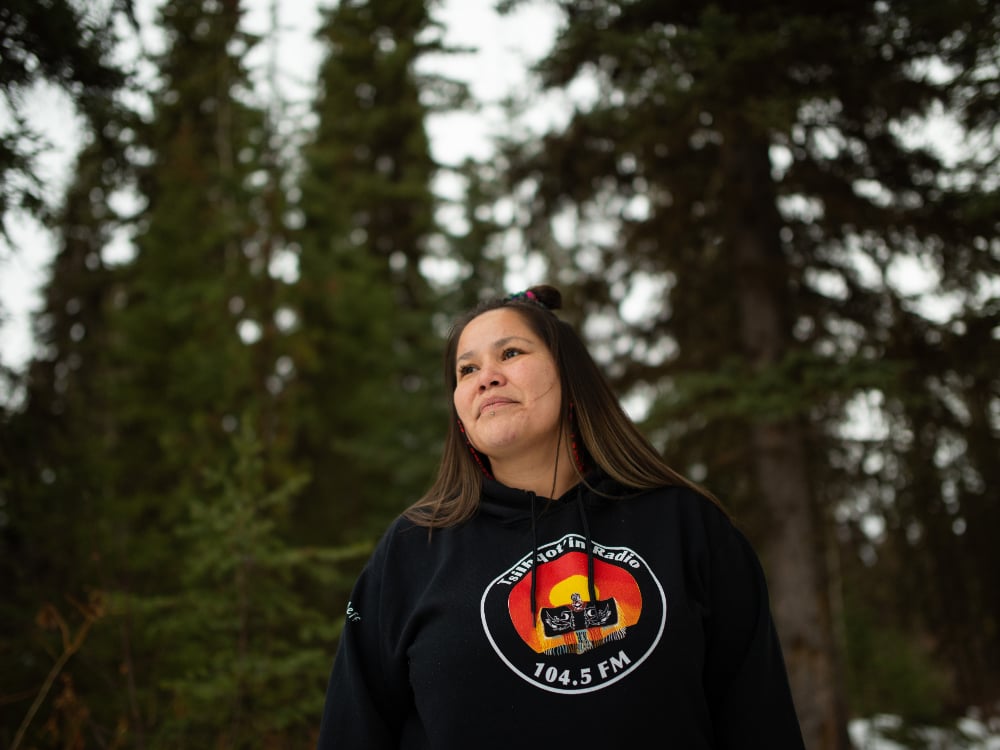Racine Jeff grew up connected to the land, frequently spending time with her grandparents in a one-room cabin two hours’ drive west of Williams Lake, British Columbia. Without electricity or running water, her needs were met by the natural world. Camping, fishing, hunting, berry picking, drying meat, tanning hides and medicine gathering were everyday activities for the young Tŝilhqot’in Nation member from Tl’etinqox. The experience left Racine deeply connected to her culture.
A trained heavy-duty mechanic, Racine worked on the rock trucks at a local mine and then in retail before returning to school to study business administration. Today, Racine’s days are full, caring for her kids, aged 13, 17 and 19, and working as a station manager for the Tŝilhqot’in Radio Station. In her spare hours, she studies online in the Indigenous Communication Arts program at First Nations University of Canada.
Racine lives in Wildwood, a small suburb on the outskirts of Williams Lake, a town of just over 10,000 people in the Cariboo. “There's a little store and maybe 50 to 100 houses across three or four streets,” says Racine. In 2017, when a lightning storm sparked wildfires near Williams Lake, the Douglas-fir woodland behind Racine’s house became fuel for the blaze.
Here is Racine Jeff’s first-hand account of surviving the Williams Lake fire as told to Amber Bear and Emilie Wren of the Climate Disaster Project:
I was in town with my friend Lyndi and her mom, Kathy. Her mom needed to go pick up things she needed and Lyndi didn't have a vehicle. We’d heard one lightning strike had started a fire. You could see it from town. I thought maybe I should head home, just in case. I was headed back and we heard of another one in Wildwood. On the way, five lightning strikes hit all the way around Wildwood.
The forest behind our house caught on fire. We live on the side of the street that backs to Crown land. Everything behind us was just trees and bushes. At first, they weren’t so worried about it. But when I got home, we got word that everybody on the north side of our road needs to get out now. Grab what you can and get out.
My sister was home with the kids. We just grabbed clothes and irreplaceable pictures with my grandparents. I had a Jeep Cherokee. My sister had a Dodge Caravan. So we gathered up all the children and loaded what we could into there. The youngest was still in Pampers, a year old maybe.
They said to evacuate so we went into town. We stayed there the night but that was all of us in a two-bedroom apartment. We were sleeping on mattresses on the floor. The next day, we went to the emergency response place. They said the fire had surrounded Wildwood, and that we wouldn’t be able to go back.
There was no room in any of the motels because so many people were displaced. There were so many of us in just a tiny little apartment building. There was nowhere else we could go. We ended up leaving to head up to Prince George.
When we were leaving, we could see the fires going down the sides of the mountains and where they burnt across the highway. We had to drive through the smoke. My sister had my kids. Kathy, Lyndi and her daughter Kasha were with me. There was so much smoke in the air that Kasha got burns in the back of her throat from breathing. You know when you get burns and you get blisters? She had that inside of her because of how thick the smoke was.
We got there pretty late. They had an emergency response centre set up at the university in the gym. They told us we could stay on cots. We are not doing that, especially with a baby.
We had a second option. The kids’ grandma lived in Prince George. We ended up staying there for a week. It was a pretty big house, but there were quite a bit of us in there. You can only last so long in somebody else’s house. That’s when we decided to go down to Kamloops because we’d had enough.
When we got to Kamloops, we signed in at their emergency place and that's when they set us up in our own motels which was a lot better than being in somebody else's space.
It was around then that all of Williams Lake evacuated. They had police units and the military come in to make sure that everybody was out. A couple of restaurant owners stayed so they could help the fire crews. They got a ton of donations to help keep the first responders and firefighters fed.
The Wildwood volunteer fire department saved a lot of our houses because they stayed. They were fighting the wildfires themselves with their little volunteer fire truck and whatever else they had available.
My community of Tl’etinqox was in danger as well. They had fires surrounding them. There was an evacuation order but the Chief and a lot of community members decided to stay because they didn’t want to lose the community. The wildlife firefighters were spread so thin in so many different directions. There was nobody there to save our community.
RCMP officers were going in and trying to force them to leave but they refused. Chief Joe Alphonse went down and met with the officers. He was like, “No, you're not coming into my community. We're here to fight to save our homes.” I get their panic to get everybody out. But also they’re full grown adults. They should be able to make their own choices to save their homes. They shouldn't be punished for wanting to save their homes.

People in the city were able to return before us because we live outside of town. We were out for a little over a month in total, where we weren’t allowed back to our house. While we were gone, there was people going around and looting the evacuated houses.
For a while we didn't even know if we had a house because there were people telling us, “Oh there's houses on fire on your street.” It was very stressful. Not knowing if we had a house or how the house was doing. We didn't know if all of our stuff was going to be there.
When we got back everything was good but the kids’ trampoline outside got hit by ash. There were a million holes in it. There was a pot of tea and it was thicker than syrup. There was food on the counters, buns, bread and kids’ snacks. Leftover food in the pots. We ended up just throwing everything out. Some of the bedroom windows were left open. We had to replace the beds, the mattresses, everything, because it was so smoke damaged.
Before the fires, it was a really thick fir and pine forest along Highway 20. Now, it’s just a lot of barren land and burnt trees. Climate change has affected things quite a bit. It’s a lot hotter, a lot drier, than it was when I was little. I remember flourishing forests, but in some places, it’s turned into a desert.
Our salmon have a harder time coming up the rivers because the rivers are a lot warmer than they were before. When we go to dip for salmon, they’re a lot lower. They're staying in the deeper water because it's colder so they're not coming up where we can dip them out of the river as well.
That year, we weren't even able to get our winter supply. Where our fishing grounds were, Gwetsilh, there were fires all the way through. Anybody that was out camping, trying to gather food, got evacuated. We go every summer and we camp and gather salmon. We weren't able to go out and do that that year. Any salmon that went up, just went up to spawn. We weren't able to hunt either because there were so many wildfires and they lasted until late in the season.
Overall, it was a learning experience. The Tŝilhqot’in National Government has set up their own emergency operations team that is putting plans in place for floods, fires to allow for more collaboration and communication. Media releases will be put out so that everyone knows what to do and where to go so that mistakes won’t be repeated. If something like this ever happens again, we have them to rely on. As a family, it made us a lot stronger. We rely on each other quite a bit and we know that no matter what we have each other.
Racine Jeff is one of 11 climate catastrophe survivors who narrate their first-hand experiences as part of Bracing for Disasters, an occasional Tyee series investigating how to support evacuees and save lives as extreme weather worsens in B.C. (Learn more about how the University of Victoria-based Climate Disaster Project conducted these interviews in this story’s sidebar.)
If you are a disaster survivor looking for support or resources, or want to know how to be prepared, read our story 'How You Can Be Ready for the Next Disaster.'
This project was funded by the inaugural Lieutenant Governor’s BC Journalism Fellowship. The Tyee retained complete editorial control of the series. ![]()
Read more: Rights + Justice, Environment
















Tyee Commenting Guidelines
Comments that violate guidelines risk being deleted, and violations may result in a temporary or permanent user ban. Maintain the spirit of good conversation to stay in the discussion and be patient with moderators. Comments are reviewed regularly but not in real time.
Do:
Do not: